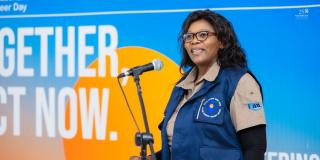
Teclah Ponde has worked at VSO for the past nine years. From originally coordinating HIV-prevention programmes in prisons in Eswatini, Malawi, Zambia and Zimbabwe, Teclah is now managing projects in these countries from inception to delivery. Here's her VSO journey.
What inspired you to work in the development sector?
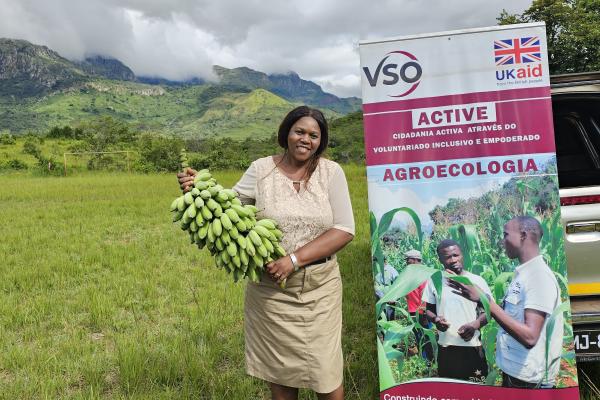
I have always been affected by how the most marginalised people, while having a lot to contribute, are not given enough resources to make meaningful changes in their lives. The development sector has created an avenue for me to be a catalyst for change. Time and again, I have seen transformative change result from our programmes aimed to support these people.
How did your journey in the development sector and at VSO start?
"I came into development work through an NGO called Themba HIV and AIDS Theatre 16 years ago. As part of the project, we worked with prisons and correctional services in South Africa. After returning to Zimbabwe in February 2008, I continued working in that space as a development worker with Progressio (formerly, Catholic Institute for International Relations).
Progressio placed development workers within local organisations in Zimbabwe to strengthen capacity and support programme development. That’s how I came to work in the Zimbabwe Association for Crime Prevention and Rehabilitation of the Offender (ZACRO) until 2015.
In that role, I developed the rehabilitation and HIV and AIDS programmes for inmates and officers. I helped train and set up peer education programmes, develop training materials and set up support groups for both inmates and officers.
I also worked for the Employers’ Confederation of Zimbabwe (EMCOZ), which had a small enterprise development project funded by the International Labour Organization. We mainstreamed HIV interventions and developed a manual and training package for HIV programming.
My first engagement with VSO was as the Regional Project Coordinator for the SDC-funded (Swiss Agency for Development and Cooperation) prisons project across the region. Upon learning about VSO's work, I immediately resonated with its mission.
How has your work evolved at VSO?
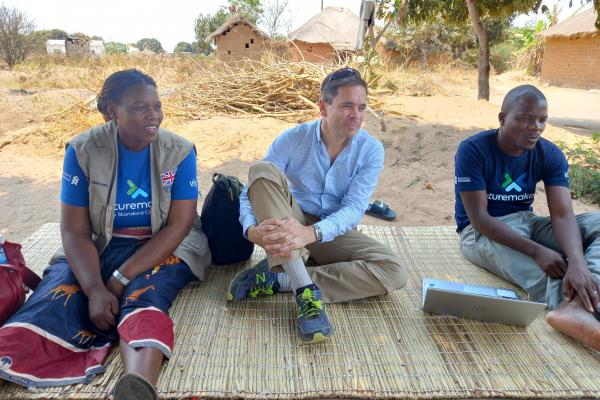
This year, I am celebrating my ninth year in VSO. I started working here in October 2015 as a Regional Project Coordinator for HIV-prevention programmes within prisons, coordinating work across four countries: Zimbabwe, Zambia, Malawi and Eswatini.
As a result of a reorganisation in June 2020, I became the Interim Country Lead for Zambia while maintaining my role as the Regional Coordinator. In March 2021, I became the Interim Head of Implementation for Zimbabwe and Zambia. The prison's project had ended at that time and since July 2021, I have served as Project Implementation Lead at VSO.
What experiences and skills help you in your role at VSO?
I came into VSO with eight years of experience in prison programming, particularly in HIV, which encompassed skills in project management, monitoring and evaluation. Project management and the entire project life cycle have been central to every role I've taken on.
My knowledge of the local terrain and experience working across multiple countries gave me an advantage, allowing me to effectively manage work in different regions, despite the variations in roles.
Of course, people management skills and ability to work with people across diverse backgrounds and levels has been another key thread of my entire professional journey.
What have been the challenges and highlights in managing projects and people at VSO?
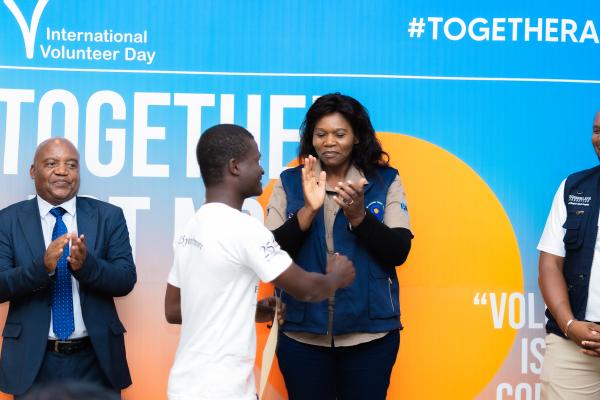
There are a lot of dynamics involved when managing people. Across the years, I have learned that managing people requires active listening, flexibility and deep understanding of VSO’s culture and ethos. This has allowed me to navigate sensitive and challenging situations. For example, we collaborate with people from diverse cultural backgrounds working in global teams spread across various time zones.
When someone says: “I cannot be at a meeting at a time when you want to meet”, due to their location or circumstances, it requires a great deal of understanding and flexibility. VSO is a highly empathetic and well-connected organisation, so even if someone says: “I'm not available”, they often link you to the next person who can provide the information that you need.
I have learned a lot from my managers, colleagues and volunteers at VSO. I also work with partners, government agencies and directly with the communities. The implementation role cuts across all these levels. That means that I need to be intentionally inclusive in my approach to understand the dynamics of different stakeholders.
That's where leadership and teamwork come in, along with talent identification within the team, to determine who can best support a project and engage effectively with various stakeholders. Through this process, I’ve learned a great deal from volunteers, recognising that I don’t possess all the necessary skills. By allowing them to lead, we all benefit from their leadership, which I find both exciting and inspirational.
What insight would you share with someone considering shifting to work or starting a career in the development sector?
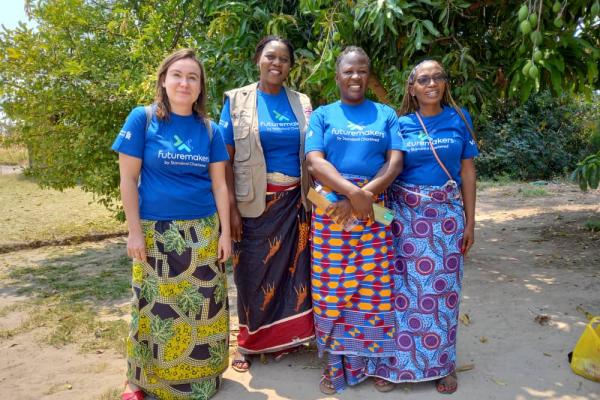
To me, development work is a profession that addresses real needs of people often neglected and left behind. It profoundly impacts their lives, and it brings out the essence of their humanity helping them become who they've been destined to be.
I have witnessed this repeatedly in the communities I’ve worked with. Three years ago, I worked in prisons, and when I meet former inmates, I see the difference we've made. They don’t call me Teclah, they call me Mother. Many have blossomed, starting small businesses and becoming independent, something they might never have achieved without the VSO programme.
Project implementation is where the real work happens. It's not just about planning frameworks, but also the satisfaction of seeing them come to life on the ground. You move beyond the thought process to directly interact with the people who feel the impact. Witnessing your ideas being actualized is what defines success.
Conversely, when a strategy falls short of its objectives, you also see first-hand the consequences it can have on people's lives. There are valuable lessons to be learned from both outcomes. If you are passionate about people, development work is truly the path to take.
What role does VSO, in your view, play in the sector’s conversation about creating economic and income-generating opportunities for the community?
VSO plays an important role in building young people's capacity in spaces like advocacy for green jobs, entrepreneurship and small-medium enterprise development. Through our resilient livelihoods programs, we offer training and mentorship in entrepreneurship and vocational skills, and we continuously look to improve the quality of this work.
We equip communities with the knowledge and skills to make informed decisions about what best meets their needs, based on the goods and services available in the market. If a business entity, for instance, comes up with fertilisers, we can push back and say: “No, we choose the agro-ecological approach, producing our own food using the resources available to us.”
We are more human-centred than traditional profit-making entity in this sense. Our 'profit' is measured by how much we restore to communities, helping them reclaim what they’ve lost and empowering them to reach their full potential.
How do you think you've changed personally and professionally because of your time at VSO?
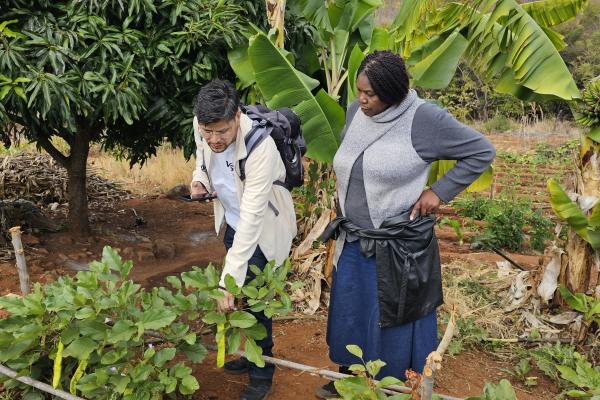
Over my nine years at VSO, I’ve grown significantly in my knowledge and wisdom, thanks to formal and informal training. The values of VSO have become ingrained in me, transforming from an organisational culture into a personal one. It's shaped how I approach my work, interact with others, and ultimately become part of who I am.
Working with people means constantly learning from them and receiving valuable feedback. Over the years, I’ve built lifelong friendships with colleagues, staff members, and volunteers. Even after some volunteers have moved on from VSO, the connections remain strong, leading to new partnerships with other organisations.
I’ve also learned how to manage relationships with volunteers who had to leave abruptly, mid-project, or under crisis. While VSO has stringent internal policies, we remain deeply people-centered. Striking this balance between values and protocols is rare, and it has taught me the importance of handling sensitive matters with professionalism and care.
What brings you joy outside of work?
I have a beautiful family—three children and my husband. When I come home, I’m embraced with love and laughter. Beyond my immediate family, I’m part of a close-knit extended family that provides immense support and comfort. I am also deeply involved in my church, where I lead prayer platforms, preach, and attend international conferences. I manage a regional prayer platform, offering snippets of prayer, preaching, and teaching. My faith is my foundation, keeping me grounded.
What are your aspirations for the future?

With additional resources, I would love to see our work have an even greater impact. Many stakeholders have urged us to expand into new areas, but resource limitations have held us back. I hope we can scale our programmes to reach more communities. I also want to see greater recognition of the contributions made by volunteers, both within and outside of VSO, with more emphasis on measuring their impact and contributions.
VSO already evaluates the impact of volunteering through the lens of the Global Standard for Volunteering and measures how volunteers contribute to the Sustainable Development Goals. However, not all institutions working with volunteers follow this approach.
We are working to educate other volunteer organisations about the importance of adopting the Global Volunteering Standards. My hope is that we can continue this work, enabling more volunteers to make meaningful contributions in their communities.
Although I’m unsure how long my tenure at VSO will be, I am deeply committed to continuing my work with communities. I particularly want to focus on supporting young people in finding purpose, especially now, when rising concerns around mental health, drug, and substance abuse are so prevalent.
I would love to provide them with resources, support their lives and work, and encourage young girls to pursue leadership roles in the workplace. That would be incredibly fulfilling for me. I began this work at my church and within community groups, but I hope to do much more. That will be my retirement package."
Life at VSO
Here at VSO, we have a team that operates across the world. Our Life at VSO blog series gives you an insight into what life is like working for a world leading international development through volunteering organisation.
Read more
Protecting the biodiversity of the East Tonlé Sap Lake through aquaculture
Aquaculture — the farming of aquatic organisms, such as eels, shellfish, and seaweed, in a controlled environment — is transforming the lives of people like Mr Em Phat, who are living on the East Tonlé Sap Lake in Cambodia.
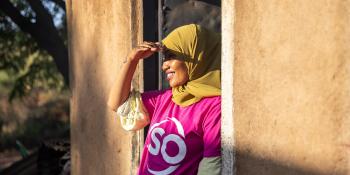
Five things women achieved this year that you might not know about
This International Women's Day, join us in celebrating the resilience of women across the globe with some female achievements you might not have heard about.
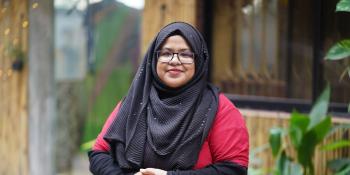
Breaking barriers: Lamia's journey of volunteering, leadership, and gender equity
Bangladesh - Lamia Tasnim's volunteering journey began in 2018, and over the course of the last six years, her passion for supporting her community has only grown.
